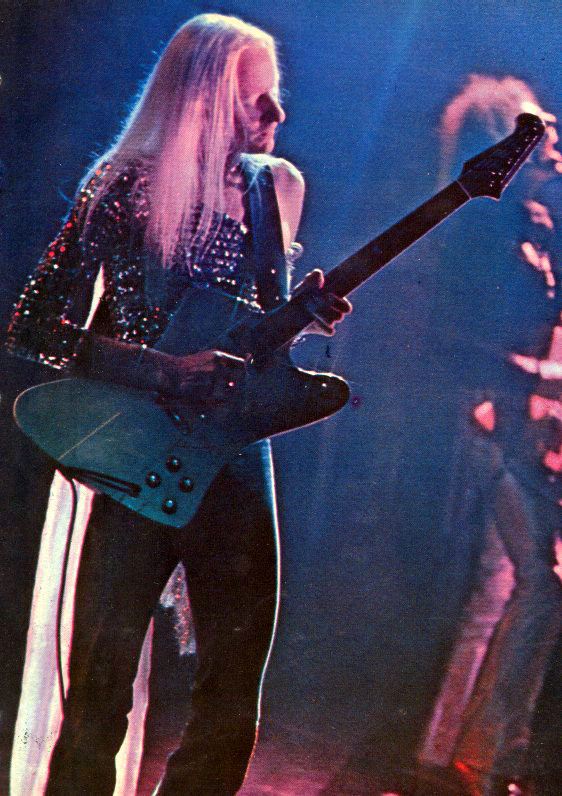In Frankfurt und München, und zuvor schon in London und Amsterdam, schwitzte das Publikum in proppenvollen Konzerthallen, und seit langem sah man wieder einmal Köpfe, die zum Takt kraftvoller Rockrhythmen rotierten, Leiber, die in Verzückung die wildesten Verrenkungen machten. Der Grund: Johnny Winter, der legendäre Gitarrist der Woodstock-Aera, ist nach bald fünfjähriger Abwesenheit zu uns zurückgekehrt. Dass man sich wirklich freuen durfte, bestätigt jeder, der dabei gewesen ist. Denn: Das hatte man nicht erwartet.
Denn wer hätte es ausgerechnet Johnny Winter zugetraut, Konzerthallen zu füllen, nachdem es nicht einmal Gruppen wie Deep Purple oder Sweet, die in der Publikumsgunst zuvorderst stehen, bei ihren letzten Tourneen fertiggebracht hatten. Zudem Johnny Winter war schon lange nicht mehr hier. Ausserdem wusste man, dass er drei Jahre in der Spritze hing und mehr als ein halbes Jahr in einem Nervensanatorium zum Entzug zubrachte. Der «schielende Albino» mit dem schlohweissen Haar brauchte keine Anwärmzeit. Gleich von Beginn an kam er mächtig in Fahrt. Seine Begleit-gruppe (ein zweiter Gitarrist, Bass und Schlagzeug) fegte los.
Dann kam Johnny und liess seine Gitarres sprechen. Bald hatte man die gewissheit: Er ist noch immer ein Gigant, seine Soli kommen sauber, glasklar und einfallsreich, er hat keine Effekthascherei, keine Tricks nötig, da ist sein Feeling, und da ist der Blues. Unglaublich, diese Vibrationen, die in die Beine, durch den ganzen Körper gehen, lassen einen nichtruhig dasitzen. Auch Johnny selber hilt es kaum aus.Er bewegt sich linkisch überiße Bühnenrampe, verzieht sein Gesicht, dreht sich um die eilee Achse, unbeholfen, beinabrf, tapsig; er richtet seine Gitarre wie ein Gewehr ins Publikum , entlockt ihr. ßie verrücktsten Tonkombinationen. funf minuten, zehn, das Solo dauert ab, Johnny geht in die Knie, derselbe Riff wird zum x-ten Mal gehracht, der Saal kocht.
Das ist die totale Musik, das ist Kommunikation ohne viele Worte. Der hässliche Blonde mit dem komischen Zylinder auf dem Kopf hat die Leute in der Hand, er ist pure Urgewalt, ohne Schnörkel und ohne Schminke. Johnny Winter, Leonard Cohen, Eric Clapton sie allen brachten in diesem herbst jede Menge Leute in ihre Konzerte, und sie törnten diese leute an. Ihre Namen stehen auch an der Spitze der Bestsellerlisten. Sie sind Profis, schon lange dabei. Und sie haben etwas gemeinsam: alle drei sind in den letzten Jahren für kurze oder längere Zeit untergetaucht.
Bei Clapton und Winter war es das Heroin, Cohen hatte einfach die Schmutze voll. Nun sind sie wieder da, um einiges reifer mild klüger. Und noch erfolgreicher als früher. Ob das ein Rezept ist, das auch fur andere gut ware?
